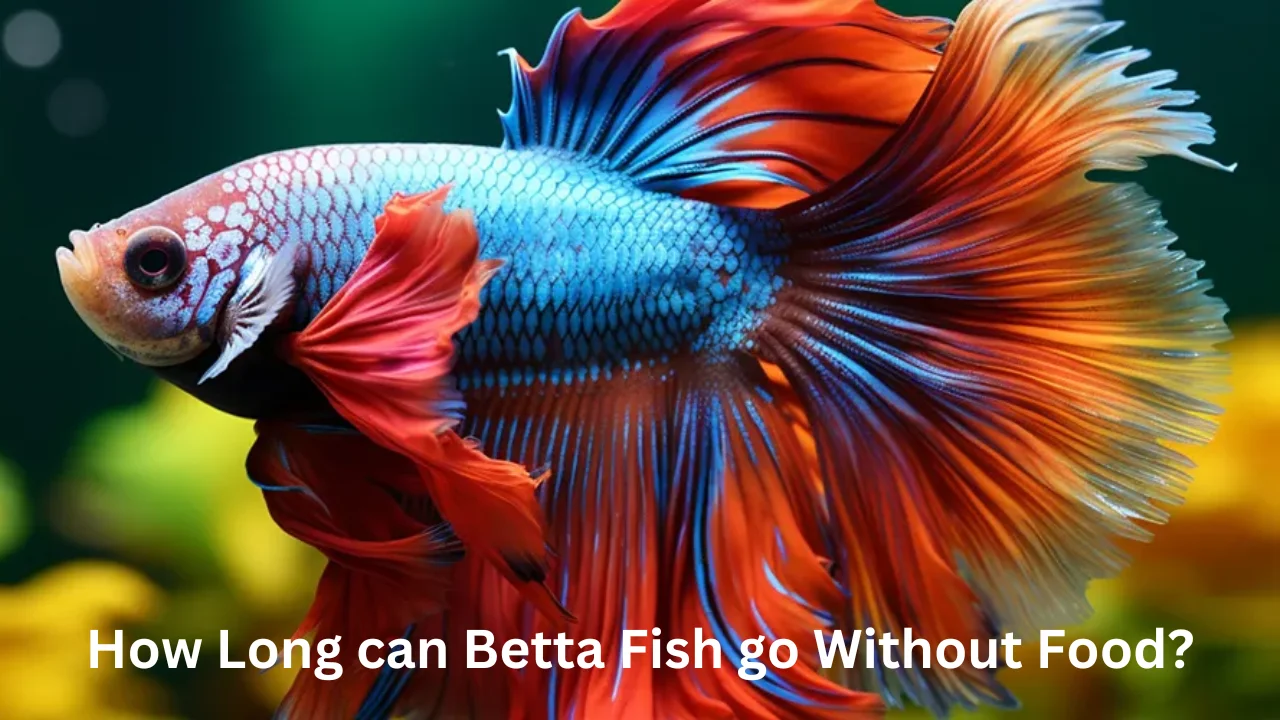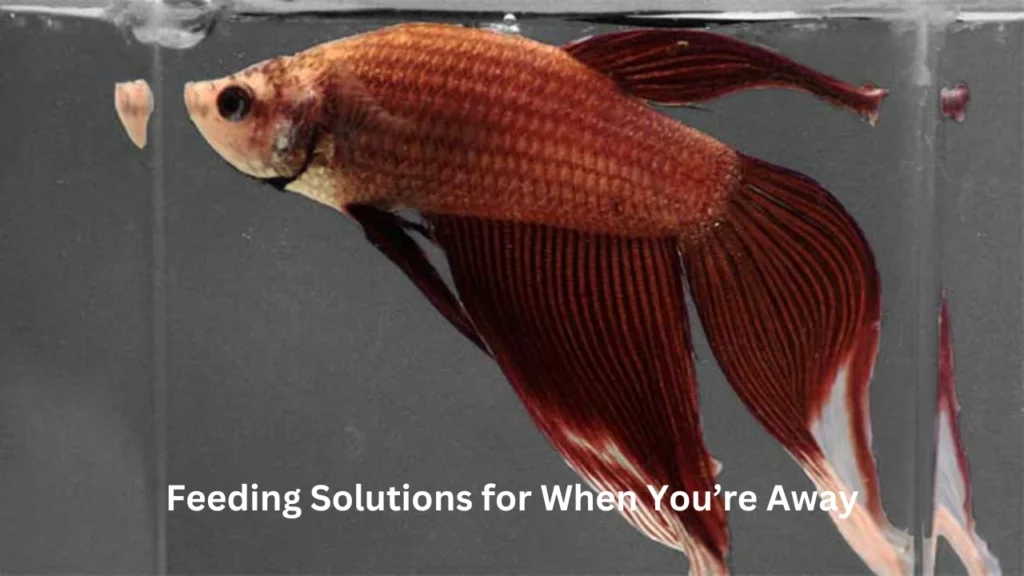How Long can Betta Fish go Without Food?

Betta fish are among the most popular pet fish due to their vibrant colors and unique personalities. However, as with any pet, ensuring their well-being requires understanding their dietary needs. If you’re planning a trip or find yourself unable to feed your betta for some time, you might wonder, how long can betta fish go without food? This is a crucial question for responsible pet owners, as improper feeding can lead to health complications.
Let’s dive deep into the feeding habits of betta fish, the risks of starvation, and tips to ensure their health while you’re away.
Understanding Betta Fish Feeding Habits
Betta fish, known for their resilience, are carnivorous by nature. In the wild, they consume small insects, larvae, and other protein-rich sources. While they are hardy, aquarium bettas are accustomed to regular feeding, making prolonged starvation a stressor for them. Generally, betta fish can survive without food for 7–14 days, but this is not ideal and can have severe health consequences.
In controlled conditions, such as aquariums, bettas rely entirely on their owners for food. Missing one or two feeding sessions is unlikely to harm them, but an extended period without food can lead to lethargy, weakened immunity, and eventually starvation. This is why knowing how long can betta fish go without food is essential for their care.
Read Also: Esther Krakue Early Life, Education and career
How Long Can Betta Fish Go Without Food?
The exact duration a betta fish can survive without food depends on factors like age, health, and environmental conditions. On average, a healthy adult betta can survive for about 10–14 days without food. However, this does not mean they will thrive. During this time, their body begins to break down fat reserves for energy, leading to visible signs of weakness and susceptibility to diseases.
Young or sick bettas are less resilient and may only survive 5–7 days without food. Similarly, poor water quality or fluctuating temperatures can exacerbate the stress caused by starvation, reducing their survival time.
| Factors Affecting Survival Without Food | Impact |
|---|---|
| Age and Health | Younger or sick bettas survive fewer days |
| Water Quality | Poor quality reduces survival time |
| Tank Conditions | Stressful conditions weaken resilience |
| Temperature | Fluctuations can lead to faster starvation |
What Happens to Betta Fish During Starvation?
When understanding how long can betta fish go without food, it’s important to recognize the stages of deterioration their body undergoes. Initially, the fish may appear unaffected as it relies on stored fat for energy. However, as these reserves are depleted, the betta becomes lethargic and less active. Reduced activity is often the first visible sign of starvation in bettas, which are naturally energetic swimmers.
As the effects of starvation deepen, the fish’s immune system weakens, making it vulnerable to infections and diseases. This is particularly risky in aquarium environments where bacteria and parasites are present. Prolonged periods without food cause muscle wasting as the betta’s body begins breaking down its tissues to survive. Ultimately, this leads to irreversible damage, including organ failure and death, emphasizing the critical need to monitor how long can betta fish go without food.
While short fasting periods of one or two days can be beneficial by aiding digestion and preventing bloating, this should not be mistaken for extended starvation. Prolonged deprivation significantly harms the fish, underscoring the importance of understanding how long can betta fish go without food to ensure their health and longevity.

Feeding Solutions for When You’re Away
Understanding how long can betta fish go without food is especially important if you need to leave your home for an extended time. Fortunately, there are ways to ensure your betta’s health even in your absence.
Automatic feeders are a great solution when considering how long can betta fish go without food during vacations or trips. These devices dispense food at scheduled intervals, ensuring your fish is fed consistently. However, it’s crucial to test the feeder beforehand to prevent overfeeding or equipment malfunctions. Feeding blocks are another option, but they must be used cautiously as they can cloud the water and degrade tank quality if not monitored properly.
Maintaining a clean tank is equally important when determining how long can betta fish go without food. Performing a partial water change before leaving helps stabilize the environment. Ensure the temperature and filtration systems are functioning well, as healthy water conditions allow bettas to cope better with short fasting periods. For extended trips, having someone check the tank weekly to monitor the fish and refill the automatic feeder can make a significant difference in their well-being.
Risks of Overfeeding
While understanding how long can betta fish go without food is essential, avoiding overfeeding is equally critical for their health. Overfeeding can cause bloating, constipation, and severe conditions like swim bladder disease, which can be life-threatening. Additionally, uneaten food decomposes in the tank, releasing harmful toxins that can poison the water and harm your betta.
To maintain a healthy feeding routine, feed your betta twice daily with an amount it can consume within 3 minutes. If you prefer feeding once a day, ensure the portion lasts 5–6 minutes. Consistency in feeding schedules supports their metabolism and overall well-being, ensuring a healthy balance whether you’re present or planning for how long can betta fish go without food during short trips.
| Feeding Frequency | Recommended Amount |
|---|---|
| Twice Daily | As much as the fish can eat in 3 minutes |
| Once Daily | A slightly larger portion lasting 5–6 minutes |
Maintaining Routine for a Healthy Betta
Betta fish thrive on consistency, so maintaining a regular feeding routine is crucial. Feeding at dawn and dusk mimics their natural feeding patterns in the wild. Routine also reduces stress, ensuring your fish remains happy and active. Sudden changes, such as skipping meals or overfeeding, disrupt their metabolism and can cause long-term health issues.
If you need to fast your betta for health reasons, limit it to one or two days. Beyond this, provide a balanced diet including protein-rich pellets, frozen bloodworms, or brine shrimp for optimal health.
Read Also: Chantal Nchako: Cameroonian Actress and Director
How long a betta fish can go without food based on different conditions
| Condition | Survival Duration Without Food | Impact on Betta Fish |
|---|---|---|
| Healthy Adult Betta | 10–14 days | Can survive but becomes lethargic, weak, and vulnerable to diseases. |
| Young or Sick Betta | 5–7 days | Less resilient; higher risk of death due to starvation and weakened immunity. |
| Poor Water Quality | 3–5 days | Faster decline due to stress and exposure to harmful substances. |
| Stable Water Conditions | 7–14 days | Prolonged survival, but stress and health deterioration still occur over time. |
| Short-Term Fasting (1–2 days) | Beneficial | Helps with digestion and prevents bloating; no significant negative effects. |
Conclusion
Betta fish are resilient creatures, capable of surviving without food for up to two weeks in dire circumstances. However, prolonged starvation significantly weakens them, increasing the risk of illness and death. It is always better to plan ahead and ensure they are fed appropriately, even in your absence.
By understanding how long can betta fish go without food, you can make informed decisions about their care. Whether using automatic feeders, enlisting help, or ensuring clean tank conditions, proactive steps can ensure your betta remains healthy and stress-free. Responsible feeding is key to a vibrant, thriving betta fish.






